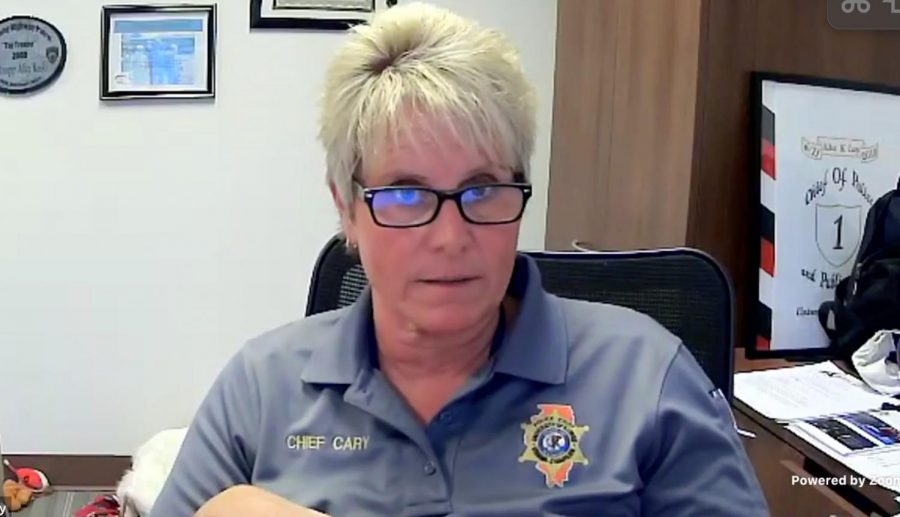UI police chief unveils programs to involve campus community
Pictured is University of Illinois Police Department Police Chief Alice Cary in a Zoom call on Oct. 12. During the call, Cary discussed a potential community outreach and support team as well as the behavioral health unit she plans on implementing.
Oct 19, 2020
University of Illinois Police Department’s Police Chief Alice Cary has plans to implement a community outreach and support team, or COST, a behavioral unit and a victim service program in response to calls for increased community involvement in policing.
COST is a specialized unit of community policing to support student education that officially began on Oct. 12. This program partners with community members to address concerns within the community that are adjacent to campus, Cary said.
“This community really wants a collaborative approach with law enforcement and public safety to get to better know us, and so that helps me in helping the community in and of itself,” Cary said. “Coming in as chief, I’ve been in a role of active listening and seeing what the community needs as well.”
Within the program, individual officers would serve as liaisons to specifically work with certain groups both on and off campus, including student and athletic organizations on campus. It is also intended to support students, faculty, staff, visitors, athletes and the communities.
She said she plans to implement a 21st century model of policing, which she said is important “especially now and moving forward with some of the downfalls of policing.” Cary said she adopted the NAACP shared principles in that model of policing in order to include all the components that include a “fair and balanced policing approach.”
Get The Daily Illini in your inbox!
According to Cary, the main objective of COST “is to improve and refine interaction between the agency and the campus community that it serves.” Securing community involvement is important and effective for the policing model Cary is attempting to implement.
In addition to COST, Cary has plans to create a behavioral health unit with the UIPD. This program will consist of officers specialized in crisis intervention that provide services or referrals to help supply meals and shelter for those in need.
The behavioral unit will also include different components to help with community members struggling with mental health. A licensed clinical social worker will be assigned to the unit to “be a conduit between social services and law enforcement.”
Sergeant Landers, Sergeant Carter, and another officer with a master’s degree in social work will eventually be joining the unit. However, it is starting off with one detective to be “conscious of not pulling everybody off of their patrol duty,” Cary said.
Cary hopes to expand on this behavioral unit and eventually have 24 hour services available for residents. In addition to the officers on this unit, animal therapy dogs will be utilized in order to help reduce stress.
The last program Cary mentioned attempting to implement was the Excellence in Law Enforcement- based Victim Assistance Training and Enrichment program, or ELEVATE. This is a 10-week program that includes a partnership with the FBI in order to focus on “victim-first” approaches to law enforcement.
Currently, the UIPD is on the waitlist for ELEVATE. More immediate steps to improve its response to sexual assault calls that Cary is looking into is to have an “advocate or someone trained in victim witness response in order to be a co-respondent for sexual assault reporting.”
These three programs are all in their beginning stages but are planned to be implemented in order to “build communication and trust … in order to contribute collaborative efforts to find resolutions.”






